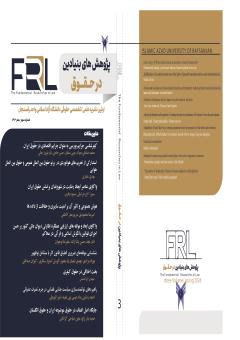Strategies for empowering judicial criminal policy in the crime of aggressive possession
Subject Areas :Ahmad Rezaeipanah 1 , Eisa Baninaeimeh 2 * , amir alboali 3
1 - دانشجوی دکتری، گروه حقوق جزا و جرم شناسی، پردیس علوم و تحقیقات خوزستان، دانشگاه آزاد اسلامی، اهواز، ایران.
2 - استادیار، گروه حقوق جزا و جرم شناسی، واحد آبادان، دانشگاه آزاد اسلامی، آبادان، ایران (نویسنده مسئول).
3 - استادیار، گروه حقوق جزا و جرم شناسی، واحد آبادان، دانشگاه آزاد اسلامی، آبادان، ایران.
Keywords: Strategy, criminal policy, aggressive occupation,
Abstract :
Aggressive possession is supported by the legislator not only as a legal case but also as a crime, and this indicates its importance and its place in maintaining public order. Article 690 of the Islamic Penal Code of Punishment is the only criminal provision in the legislative process of this offense, which has many defects in its content, which has faced problems in dealing with this crime, which requires the use of a single criminal policy as a part of policy making. The public of the country can respond appropriately to similar criminal phenomena, and in the meantime, judicial criminal policy as a manifestation of the measures and policies that the judiciary - especially the judges - apply in line with the implementation of the law and in the course of it more than other types. Criminal policy has an appearance. These policies include the type of attitude of judges towards legislative criminal policy, which emerges and manifests in the form of judicial decisions and opinions according to the type of resources and facilities of the judicial system and with regard to the administrative aspects governing the criminal justice system. These policies include the type of attitude of judges towards legislative criminal policy, which emerges and manifests in the form of judicial decisions and opinions according to the type of resources and facilities of the judicial system and with regard to the administrative aspects governing the criminal justice system.
تحریرالوسیلۀ امام خمینی در خمینی، روحالله (۱۳۹۰ ق)، تحریرالوسیله، ۲ جلدی، نجف اشرف: مطبعةالآداب.
حیاتی، علی عباس و حامد هادی (1391)،«مبانی دعوای رفع تصرف عدوانی در حقوق ایران (مطالعه تطبیقی در فقه امامیه و حقوق فرانسه)»،پژوهشنامه حقوق اسلامی، 9(28).
گلدوزیان، ایرج(1380)، حقوق جزای اختصاصی، تهران: انتشارات دانشگاه تهران، چاپ هشتم.
طیرانیان، غلامرضا (۱۳۷۶)، دعاوی تصرف، تهران: گنج دانش.
شریف، علی اصغر (1339) مظاهر تصرف عدوانی، جلد اول، چاپ دوم.
حسینی، سیدمحمد (1383)، سیاست جنایی در اسلام و در جمهوری اسلامی ایران، تهران: سمت.
لازرژ، کریستین (1382)، درآمدی به سیاست جنایی، ترجمه علی حسین نجفی ابرند آبادی، تهران: میزان.
لواسور، ژرژ (۱۳۷۲-۱۳۷۱)، «سیاست جنایی»، ترجمه علیحسین نجفی ابرندآبادی، مجلۀ تحقیقات حقوقی، پاییز و زمستان ۱۳۷۱ و بهار و تابستان ۱۳۷۲ شماره ۱۱ و ۱۲.
محسنی تبریزی، علیرضا (۱۳۹۵)، روش تحقیق کیفی مکاتب تفسیری (زمینه و کاربرد)، تهران: انتشارات اطلاعات.
محمدعلیزاده اشکلک، حبیب (۱۳۸۳)، سیاست جنایی قضایی جمهوری اسلامی ایران، رساله دکتری، دانشگاه تهران.
مهرا، نسرین (1386)، «کیفر و چگونگی تعیین آن در فرایند کیفری انگلستان»، مجله تحقیقات حقوقی، دانشکده حقوق دانشگاه شهید بهشتی، شماره 45.
دلماس مارتی (۱۳۸۱)، نظامهای بزرگ سیاست جنایی، ترجمه: علیحسین نجفیابرندآبادی، چاپ اول، تهران: میزان.
نجفیابرندآبادی، علیحسین (۱۳۷۹)، «درآمدی به جنبههای مختلف سیاست جنایی در قبال مواد مخدر» در: مجموعه مقالات همایش بینالمللی علمی ـ کاربردی جنبههای مختلف سیاست جنایی در قبال مواد مخدر، تهران: نشر روزنامه رسمی.
نجفی ابرندآبادی، علیحسین (1382)، از سیاست کیفری تا سیاست جنایی، تهران: انتشارات میزان.
نجفی ابرندآبادی، علیحسین (۱۳۸۸)، «قوۀ قضائیه در سنجۀ حکمرانی خوب»، در نقش رئیس قوۀ قضائیه در فرآيند کیفری، غلامحسین آماده، تهران: نشر دادگستر.

